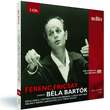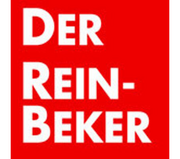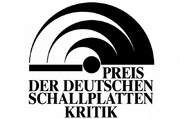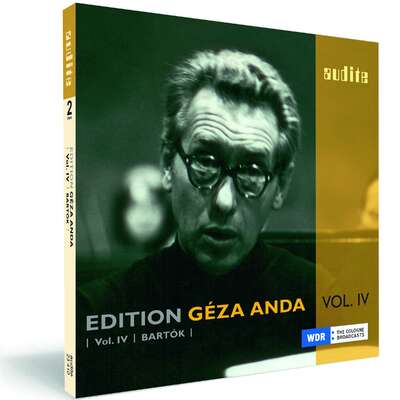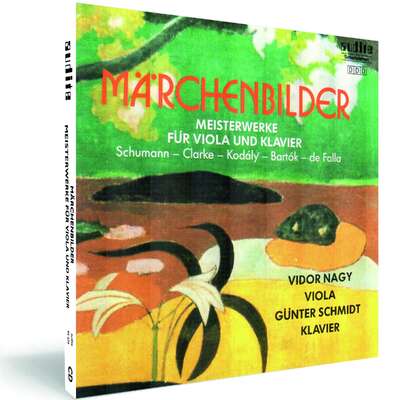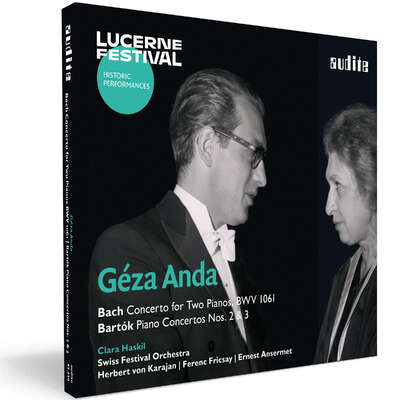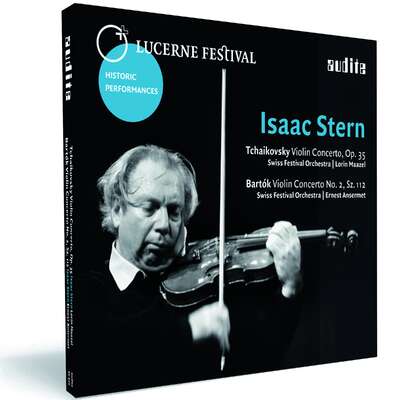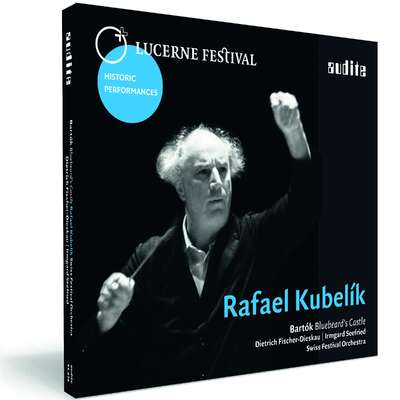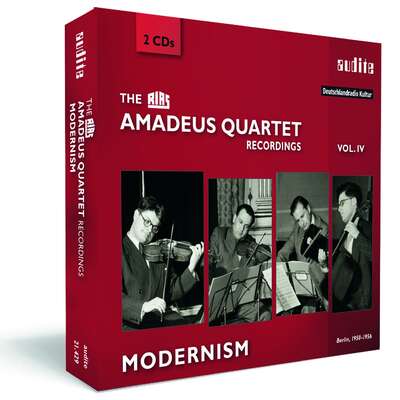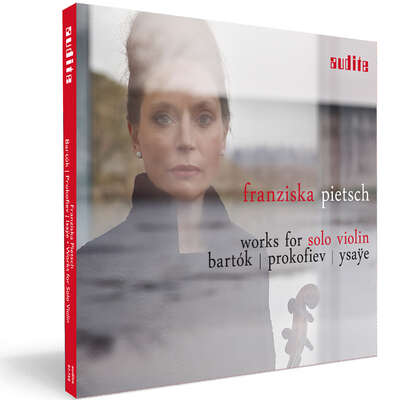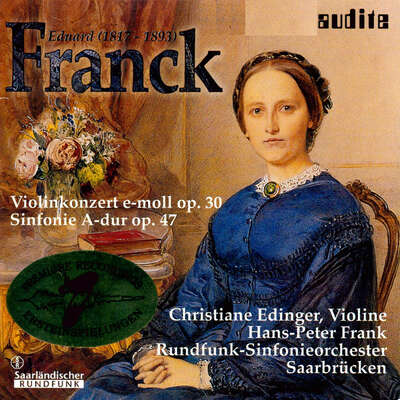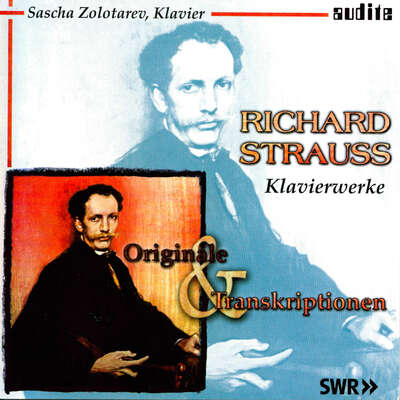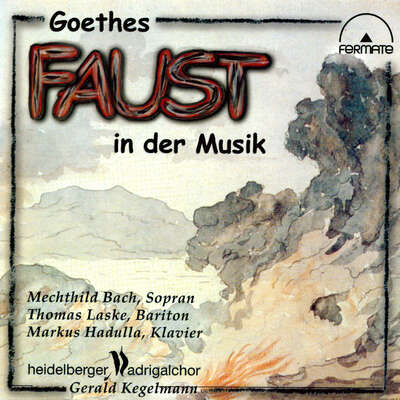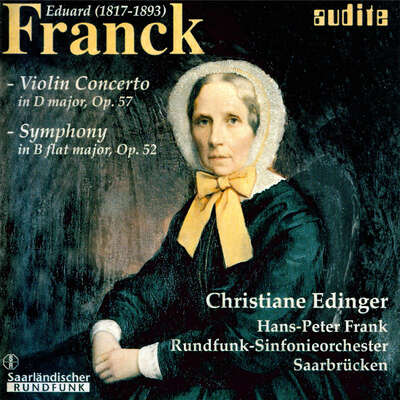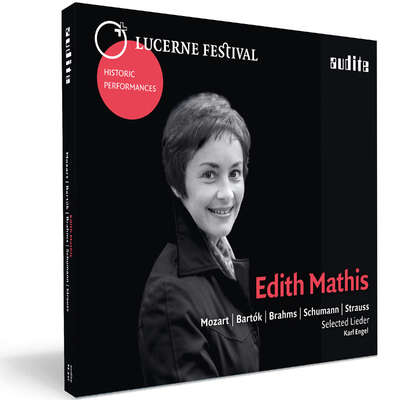
This anthology of Ferenc Fricsay’s splendid Bartók recordings for the RIAS Berlin documents a summit meeting of famous Hungarian soloists: the pianists Géza Anda, Andor Foldes, Louis Kentner and the violinist Tibor Varga. Fricsay’s time-tested and congenial vocal soloist, once again, is Dietrich Fischer-Dieskau.more
This anthology of Ferenc Fricsay’s splendid Bartók recordings for the RIAS Berlin documents a summit meeting of famous Hungarian soloists: the pianists Géza Anda, Andor Foldes, Louis Kentner and the violinist Tibor Varga. Fricsay’s time-tested and congenial vocal soloist, once again, is Dietrich Fischer-Dieskau.
Track List
Details
| Ferenc Fricsay conducts Béla Bartok – The early RIAS recordings | |
| article number: | 21.407 |
|---|---|
| EAN barcode: | 4022143214072 |
| price group: | CL |
| release date: | 18. February 2011 |
| total time: | 213 min. |
Bonus Material
-
21407_Producer's Comment [german]_Ferenc Fricsay conducts Bartok
First-hand impressions of producer Ludger Böckenhoff [german]
- Press Info
- Supersonic Award_Pizzicato 042011
Informationen
The project of a representative, possibly even complete, recording of Bartók’s oeuvre formed a part of Fricsay’s work from the beginning of his time in Berlin. These RIAS recordings feature almost exclusively Hungarian artists for the solo parts: a novelty at the time. In Fricsay’s view, Hungarian soloists were best suited to realising his precise concept of the close relationship between, on the one hand, Hungarian language and culture and, on the other, interpreting Hungarian music authentically. The only exception is Fischer-Dieskau, whom Fricsay much admired.
This compilation from 1951 until 1953 includes all surviving Bartók recordings from the RIAS archives with Fricsay. It begins with opus 1, the Rhapsody for piano and orchestra (1904) and conceived in an entirely Hungarian idiom, and goes via the expressionist, agitated Deux Portraits Op 5 (1907-08) and the powerfully optimistic Dance Suite (1921) up to the masterworks of the 1930s: the neo-baroque influenced Second Piano Concerto (1930-31), the archaic, fairytale-like and darkly coloured Cantata Profana (1932), the splendid Music for Strings, Percussion and Celesta (1935), the lucid Second Violin Concerto (1937-38) and the mysterious Divertimento of 1939 with which Bartók marked the beginning of his inner farewell to Europe. Even today, more than sixty years after these recordings were made, Fricsay’s intensity is perceptible for the listener as an existential experience – both in the impetus and the positive power of the rhythm, and also in the mysteriously resigning and ironically contorted moments in this music which is so rich in nuances. This was made possible by the cooperation with other world-famous alumni of the Budapest Music Academy where Fricsay had himself studied: the pianists Géza Anda, Andor Foldes and Louis Kentner, as well as the violinist Tibor Varga. Dietrich Fischer-Dieskau joined Fricsay as a soloist in the opera Bluebeard’s Castle and the Cantata Profana. His singing (albeit in German) congenially corresponded to Fricsay’s ideal of dramatically thrilling and passionately precise Bartók interpretation.
There is a “Producer’s Comment” from producer Ludger Böckenhoff about this production available at http://www.audite.de/de/download/file/304/pdf.html.
The production is part of our series „Legendary Recordings“ and bears the quality feature „1st Master Release“. This term stands for the excellent quality of archival productions at audite. For all historical publications at audite are based, without exception, on the original tapes from broadcasting archives. In general these are the original analogue tapes, which attain an astonishingly high quality, even measured by today‘s standards, with their tape speed of up to 76 cm/sec. The remastering – professionally competent and sensitively applied – also uncovers previously hidden details of the interpretations. Thus, a sound of superior quality results. CD publications based on private recordings from broadcasts or old shellac records cannot be compared with these.
Reviews
Die Tonkunst | Juli 2013 | Tobias Pfleger | July 1, 2013 Edition Ferenc Fricsay – Werke von Haydn, Mozart, Beethoven, Rossini, Bizet, Brahms, Strauß, Verdi, Bartók u. a.
Ferenc Fricsay gehörte zu den bedeutenden Dirigenten des mittleren 20.Mehr lesen
American Record Guide | 16.10.2012 | David Radcliffe | October 16, 2012
The 1950s was the great decade for Bartok performances — would that the composer had been still alive! It was a remarkable recovery considering theMehr lesen
The RIAS Symphony doesn’t help: they are competent in what must have been unfamiliar repertoire, but they certainly come across as Berliners: their sound is smooth and attractive but lacking in earth tones. That said, Fricsay’s soloists, Hungarian compatriots all, supply the necessary ingredients to make Bartok sing.
The concertos are all wonderful, particularly Tibor Varga in the violin concerto and Geza Anda in the Third Piano Concerto. Conceding that Bartok performances can work even in the mode of high-modernist abstraction, I much prefer the color and inflection that typified central European music-making in the composer’s lifetime. Since Bartok concertos are not heard so often now as in the 1950s, and since this collection has been admirably produced from original sources (studio and broadcast) it is well worth seeking out.
WDR 3 | Freitag, 20.07.2012: Klassik Forum | Hans Winking | July 20, 2012
Historische Aufnahmen
Ferenc Fricsay dirigiert Werke von Béla Bartók
In Berlin nach dem 2. Weltkrieg wuchs mit dem 1946 gegründetenMehr lesen
Pizzicato | N° 221 - 3/2012 | March 1, 2012 ICMA 2012: Historical Recording
Pizzicato: Supersonic – Fricsay hat Bartok nie weichgekocht, er serviert ihn uns in intensiv aufbereitetem rohen Zustand, mit viel Impetus und einerMehr lesen
DeutschlandRadio | 01.02.2012 | February 1, 2012
International Classical Music Award 2012 für historische Aufnahmen aus dem RIAS-Archiv
"Ferenc Fricsay conducts Béla Bartók • The Complete RIAS Recordings" ausgezeichnet
Die Edition "Ferenc Fricsay conducts Béla Bartók • The Complete RIAS Recordings" aus den Archiven des Deutschlandradios erhält den InternationalMehr lesen
Die vorliegende Anthologie der Bartók-Aufnahmen Ferenc Fricsays für den RIAS Berlin dokumentiert ein Gipfeltreffen berühmter ungarischer Solisten: die Pianisten Géza Anda, Andor Foldes, Louis Kentner und der Geiger Tibor Varga. Fricsays bewährter und kongenialer Gesangssolist ist Dietrich Fischer-Dieskau. Der Dirigent Ferenc Fricsay gilt als authentischer Interpret der Werke Béla Bartóks, was dem Wert der Einspielungen zusätzliches Gewicht verleiht. In der klanglichen Präsentation überzeugt die Edition durch äußerst sorgfältiges Remastering der originalen Masterbänder.
Nach zahlreichen anderen Auszeichnungen, etwa dem "Preis der deutschen Schallplattenkritik" 2/2011 gewinnt die Edition "Ferenc Fricsay conducts Béla Bartók" mit dem International Classical Music Award (ICMA), dem Nachfolger des MIDEM Classical Award, nun eine der höchsten internationalen Auszeichnungen der Musikszene. Die Classical Awards werden jährlich von einer unabhängigen Jury vergeben, der Musikjournalisten führender internationaler Musikmagazine, Radiosender und Musikinstitutionen angehören.
Die Preisverleihung findet am 15. Mai 2012 in Nantes statt.
Fono Forum | Dezember 2011 | Christoph Vratz | December 1, 2011 Empfehlungen unserer Mitarbeiter 2011
Historische Aufnahme des Jahres:<br /> <br /> Die Wiederentdeckungen beim Label Audite (etwa Ferenc Fricsay mit Bartók)Mehr lesen
Die Wiederentdeckungen beim Label Audite (etwa Ferenc Fricsay mit Bartók)
Die Wiederentdeckungen beim Label Audite (etwa Ferenc Fricsay mit Bartók)
www.opusklassiek.nl | december 2011 | Aart van der Wal | December 1, 2011
In het Berlijnse Titania-Palast (in mijn oren min of meer een akoestischMehr lesen
Hi-Fi News
| October 2011 | Christopher Breunig | October 1, 2011
Radio revelations
All Fricsays’ 1960s Bartók recordings made by RIAS engineers have been collected as an Audite set. In some ways they surpass the DG studio equivalents. Christopher Breunig explains why
Few music premieres have created such uproar as Le Sacre du printemps, given in Paris in 1913 under Pierre Monteux. Nowadays the score presents fewMehr lesen
Look back 40 years to the 1961 Gramophone catalogue and there’s a substantial Bartók listing: six versions of the relatively popular Concerto for Orchestra, for instance – though none far better than the 1948 Decca 78rpm set by van Beinum. One name that recurs is that of the Hungarian conductor, signed to DG, Ferenc Fricsay. He was in charge of the RIAS Orchestra (Radio in American Sector, Berlin), with access to the Berlin Philharmonic for certain projects. Sessions were held in the Jesus-Christus-Kirche, which had excellent acoustics. The classical director of the orchestra Elsa Schiller invited Fricsay to Berlin in 1948; later she would become a key figure in organising Deutsche Grammophon’s postwar repertory.
The German company Audite has now issued a 3CD set [21.407] from radio tapes duplicating most of the DG material but with different soloists, eg. Foldes in the Rhapsody; Kentner in the Third Piano Concerto [live]. A 1953 studio Second with Géza Anda adds to his live versions with Karajan, Boulez, et al. There’s no Concerto for Orchestra or First Piano Concerto, but Audite offers alternatives for the Second Violin Concerto (Tibor Varga) [live]. Cantata profana (Fischer-Dieskau/Krebs), Dance Suite, Divertimento for strings [live], Two portraits (Rudolf Schulz) and Music for strings, percussion and celesta.
These RIAS recordings were also made in the Berlin church; the live tapes are from the Titania-Palast. The booklet note veers from dry facts to contentious opinion!
Some tape!
We all know that, as Allied bombers were flying over Germany, radio engineers were still tinkering with stereo and were able to record on wire (precursor to tape). The tape quality on DG mono LPs has always amazed me and in this Audite set there’s a prime example with the Third Piano Concerto. The levels were set, frankly, far too high and with the soloist rather close. But even when the overload is obvious, somehow it still sounds ‘musical’.
This is the performance which stands out for me as most significant. Louis Kentner, born in Hungary (as Lajos), had come to the UK in 1935, marrying into the Menuhin family, and had, with the BBC SO under Boult, given the European premiere of this work – they recorded it the very next day, in February 1946.
A Liszt specialist, he plays here with total aplomb, notably in the counterpoint of the finale. The ‘night music’ section of the Adagio religioso, instead of bristling with insects and eery rustles, sounds more akin to a Beethoven scherzando. His touch put me in mind of something the composer had demonstrated to Andor Foldes: ‘This [playing one note on the piano] is sound; this [making an interval] is music.’ The last two notes of movements (ii) and (iii) here are very much musical statements. Notwithstanding the limitations of the 1950 source, many orchestral colours struck me anew. In sum: this may not be a version to introduce a listener to the concerto, but it’s a version those familar with it should on no account miss. And it illustrates perfectly the thesis that today’s smoother readings lose something indefinable yet essential.
Brilliant illumination
Fricsay died aged only 49. If you don’t know his musicianship, the intensity in the slow movement of the Divertimento here (far greater than on his DG version) will surely be a revelation. He appeared, said Menuhin, ‘like a comet on the horizon … no-one had greater talent.’
Scherzo | Jg. XXVI, N° 269 | Santiago Martín Bermúdez | August 1, 2011 Bartók y Fricsay: Históricos
Las grabaciones de obras de Bartók dirigidas por Ferenc Fricsay en laMehr lesen
www.operanews.com | July 2011 — Vol. 76, No. 1 | David Shengold | July 1, 2011 Bartók: Cantata Profana (and other instrumental works)
Ferenc Fricsay (1914–63) was a master of many musical styles but broughtMehr lesen
Fanfare | Issue 34:6 (July/Aug 2011) | Lynn René Bayley | July 1, 2011
This wonderful three-CD set presents itself as Fricsay’s complete recordings of Bartók’s music, yet the liner notes refer to DG studio recordingsMehr lesen
What is present is, for the most part, marvelous, though the tightly miked, over-bright sound of the Violin Concerto No. 2 and the Divertimento for String Orchestra somewhat spoil the effect of the music. In both, the brass and high strings sound as shrill as the worst NBC Symphony broadcasts, and this shrill sound also affects Varga’s otherwise excellent solo playing. On sonic rather than musical terms, I was glad when they were over. The remastering engineer should have softened the sound with a judicious reduction of treble and possibly the addition of a small amount of reverb.
Needless to say, the studio recordings are all magnificent, not only sonically but meeting Fricsay’s high standards for musical phrasing. I’m convinced that it is only because the famous Fritz Reiner recording is in stereo that his performance of the Music for Strings, etc. is touted so highly; musically Fricsay makes several points in the music that Reiner does not. The liner notes lament that the Cantata profana is sung in German in order to accommodate two of Fricsay’s favorite singers, Helmut Krebs and Dietrich Fischer-Dieskau. No matter, for the performance itself is splendid and, sonics again aside, it has never been surpassed.
In a review I previously wrote of a modern pianist’s recordings of the Bartók concertos, I brought up the Annie Fischer–Igor Markevitch recording of No. 3 as an example of what the music really should sound like. The Anda–Fricsay recording of No. 2 is yet another example. The music flies like the wind, none of the brass interjections or rhythmic propulsion are ignored, yet none of it sounds like a jackhammer chopping up the pavement of your brain. Indeed, the Adagio enters and maintains a particularly soft and mysterious sound world that is the essence of Bartók’s post-Romanticism. The notes take Kentner to task for glossing over “some of the intricacies of the fragile dialogue between soloist and orchestra in the middle movement” of the Third Concerto, but I find this a small if noticeable blemish in this live concert performance. Many of the orchestral textures completely contradict what one hears in the modern recording on Chandos, and even Kentner’s very masculine reading has more of a legato feeling.
If you take in stride some of the harshness in the live performances (particularly the violin concerto), you’ll definitely want this set in your collection. So much in these performances represents Bartók’s music as it should sound, and it should be remembered that Kodály, Bartók, and Dohnányi were Fricsay’s teachers at the Liszt Music Academy in Budapest. Historically informed performance students, take heed.
Classical Recordings Quarterly | Summer 2011 | Alan Sanders | July 1, 2011
This set contains all the surviving RIAS recordings by Ferenc Fricsay of Bartók's music (a 1958 recording of Bluebeards Castle was woefullyMehr lesen
Though the radio recordings of the remaining works all date from 1950-53 they are all more than adequate in sound – sometimes they are startlingly good. Varga's live recording of the Second Violin Concerto is the only failure in Audite's set. The soloist's playing is frankly very poor, since it is technically fallible, with bad intonation and an unpleasantly insistent, rapid vibrato, and as recorded Vargas tone quality is squally and scratchy. (In their "Portrait" issue DG offered Varga's commercial recording, made some months earlier. Here the playing is more accurate, but the unpleasant vibrato and undernourished tone are again in evidence.) It is a relief to hear Rudolf Schulz's solo violin performance in the First Portrait, for he plays most beautifully.
Music for Strings, Percussion and Celesta, with its separate instrumental groups, does really need stereo recording, but Fricsay's lithe, intense performance is superlative. In common with the Violin Concerto the Divertimento performance derives from a concert performance, rather than one prepared in the radio studio. Fricsay uses a big string group and neither intonation nor ensemble are accurate, but the performance is characterful – strong, poetic and full of energy. In the Dance Suite Fricsay, as opposed to Dorati in his equally authoritative but very different performances, is more flexible, less insistent rhythmically, and his tempi tend to be a bit faster. Two equally valid views of this appealing work.
Audite's third disc comprises works for piano and orchestra played by three pianists famous for their Bartók. Andor Foldes is given a forward balance in the Rhapsody, but not even his advocacy can convince me that this early, derivative work is an important item in the composer's output. Géza Anda's commercial stereo recording of the Second Concerto with Fricsay is familiar to Bartók admirers. In his 1953 performance the younger Anda chooses quite fast tempi in the outer movements, but Fricsay follows willingly, and the result is a fine combination of virtuoso playing and conducting. Both the poetic sections of the middle movement and its quicksilver elements come to life vividly. It's good to have such an important souvenir of Kentner's Bartók in the Third Concerto. He brings a satisfyingly tougher than usual approach to the work as a whole – nothing is 'prettified', and his performance and that of the orchestra are quite brilliant.
Junge Freiheit | Nr. 26/11 (24. Juni 2011) | Sebastian Hennig | June 24, 2011 Behutsame Formbildung
Die Aufnahmen von Béla Bartóks Orchesterwerken durch dasMehr lesen
www.ResMusica.com | 20 juin 2011 | Pierre-Jean Tribot | June 20, 2011 Fricsay dirige Bartók, un monument d’Histoire
L’excellent label berlinois Audite réputé pour le grand soin apportéMehr lesen
Schwäbische Zeitung | Freitag, 10. Juni 2011 | man | June 10, 2011 The Hungarian Connection
Das Label Audite veröffentlicht die interessanten und impulsivenMehr lesen
Der Reinbeker | Jg. 47, Nr. 11 (6. Juni 2011) | Peter Steder | June 6, 2011 Von Klassik bis Jazz und Rock
Ein Knüller: Erstveröffentlichung aller erhaltenen Bartok-EinspielungenMehr lesen
www.schallplattenkritik.de | 2-2011 | Christoph Zimmermann | May 15, 2011 Historische Aufnahmen Klassik
Schatzgrube RIAS: Fricsays hochemotionales, energisches Dirigat läßtMehr lesen
www.schallplattenkritik.de | 2/2011 | Prof. Dr. Lothar Prox | May 15, 2011
Urkunde siehe PDFMehr lesen
www.klavier.de
| 08.05.2011 | Tobias Pfleger | May 8, 2011
Scharfe Rhythmen
Bartok, Bela: Violinkonzert Nr.2
Ferenc Fricsays Einsatz für die Musik Béla Bartóks wird von Audite mitMehr lesen
klassik.com | 08.05.2011 | Tobias Pfleger | May 8, 2011 | source: http://magazin.k... Scharfe Rhythmen
Das Label Audite hat sich in der Vergangenheit mit der VeröffentlichungMehr lesen
Diapason | N° 591 Mai 2011 | Patrick Szersnovicz | May 1, 2011 Bela Bartok
«Dans une partition, je m'attaque d'abord au passage le plus faible et c'est à partir de là que je donne forme à l'ensemble», disait FerencMehr lesen
Tout aussi électrisante, et bénéficiant d'une étonnante clarté des attaques, est la Musique pour cordes, percussion et célesta captée le 14 octobre 1952, au minutage plus généreux que la version de juin 1953 (DG). Inspiré de bout en bout, Fricsay souligne chaque incise tout en privilégiant la continuité, l'ampleur de respiration, l'airain des rythmes et un éclairage polyphonique d'une extrême sensibilité. Vertus précieuses dans la Suite de danses captée le 10 juin 1953 comme dans le Divertimento pour cordes (live du 11 février 1952).
Un rien distant, Fricsay souligne moins les inflexions «hungarisantes» du Concerto pour violon n° 2 (avec Tibor Varga, 1951) que lors de l'enregistrement avec les Berliner Philharmoniker (DG, 1951), tandis que les qualités poétiques et analytiques de la version «officielle» du Concerto pour piano n° 2 avec Geza Anda (DG ou Philips, 1959) ne sont pas tout à fait égalées. Andor Foldes dans la Rhapsodie pour piano et orchestre (studio, 12 décembre 1951) et plus encore Louis Kentner dans le Concerto n° 3 (live, 16 janvier 1950) semblent en revanche aller plus loin dans la simplicité lumineuse. Inégal, donc. Mais à ce niveau, et avec une telle qualité sonore: indispensable!
Fono Forum | Mai 2011 | Thomas Schulz | May 1, 2011 Authentisch
Man darf wohl ohne Übertreibung feststellen, dass kein Dirigent unmittelbar nach dem Zweiten Weltkrieg so viel für die Akzeptanz der Musik BélaMehr lesen
Was zuallererst überrascht, ist die hervorragende Klangqualität. Den CDs liegen die originalen Rundfunkbänder zugrunde, und durch das Remastering wurde eine Transparenz erreicht, die vorbildlich genannt werden kann; eine Ausnahme bildet lediglich der Live-Mitschnitt des dritten Klavierkonzerts. Weniger überraschen dürfte das durchweg hervorragende interpretatorische Niveau; Fricsay, der noch bei Bartók studierte, beherrscht naturgemäß das spezifisch ungarische Element dieser Musik, ihr gleichsam der Sprachmelodie abgelauschtes Rubato. Auch weigert er sich, Bartóks Musik im Tonfall eines permanenten "barbaro" ihrer zahlreichen Facetten zu berauben.
Adäquat unterstützt wird er dabei von den Solisten: Andor Foldes in der Rhapsodie op. 1, Géza Anda im zweiten und Louis Kentner im dritten Klavierkonzert sowie Tibor Varga im Violinkonzert Nr. 2. Die "Cantata profana" erklingt in einer deutschen Übersetzung, doch Dietrich Fischer-Dieskau und dem Tenor Helmut Krebs gelingt es, Inhalt und Grundaussage des viel zu selten aufgeführten Werks überzeugend zu transportieren.
Stereo | 5/2011 Mai | Thomas Schulz | May 1, 2011
Béla Bartók
Orchesterwerke und Konzerte
Kein Dirigent unmittelbar nach dem Zweiten Weltkrieg hat wohl so viel fürMehr lesen
Classica | n° 132 mai 2011 | Stéphane Friédérich | May 1, 2011
Quand Fricsay dirige Bartók
LE LABEL ALLEMAND AUDITE ÉDITE UNE ANTHOLOGIE BARTÓK DU LEGS DE FRICSAY AVEC LE RIAS DE BERLIN. IDIOMATIQUE ET MAGNIFIQUE!
Le label Audite a réuni dans ce coffret de 3 CD une anthologie Bartók (etMehr lesen
auditorium | May 2011 | May 1, 2011
koreanische Rezension siehe PDF!Mehr lesen
Gramophone | May 2011 | Rob Cowan | May 1, 2011
Rob Cowan's monthly survey of reissues and archive recordings
Musical evangelists – A trio of releases that re-energise familiar repertoire
Audite continues its valuable series of radio broadcasts of that most gifted of regenerative post-war conductors, Ferenc Fricsay, with a three-disc,Mehr lesen
Louis Kentner gave the Third Concerto's European premiere and his big-boned version of the Third calls for plenty of Lisztian thunder, especially in the outer movements, whereas the central Adagio religioso recalls the free-flowing style of Bartók's own piano-playing. Fricsay's commercial record of the Second Violin Concerto with Tibor Varga was always highly regarded, even though not everyone takes to Varga's fast and rather unvarying vibrato. Although undeniably exciting, this 1951 live performance falls prey to some ragged tuttis while Varga himself bows one or two conspicuously rough phrases. To be honest, I much preferred the warmer, less nervy playing of violinist Rudolf Schulz in the first of the Two Portraits, while the wild waltz-time Second Portrait (a bitter distortion of the First's dewy-eyed love theme) is taken at just the right tempo. Fricsay's 1952 live version of the Divertimento for strings passes on the expected fierce attack in favour of something more expressively legato (certainly in the opening Allegro non troppo) and parts of the Dance Suite positively ooze sensuality, especially for the opening of the finale, which sounds like some evil, stealthy predator creeping towards its prey at dead of night. Fricsay's versions of the Music for Strings, Percussion and Celesta and Cantata profana (with Helmut Krebs and Dietrich Fischer-Dieskau, sung in German) combine an appreciation of Bartók's mystical side with a keenly focused approach to the faster music's syncopated rhythms. Both works were recorded by Fricsay commercially but the extra adrenalin rush – and, in the case of Strings, Percussion and Celesta, extra breadth of utterance – in these radio versions provides their own justification. Good mono sound throughout and excellent notes by Wolfgang Rathert.
I was very pleased to see that Pristine Classical has reissued Albert Sammons's vital and musically persuasive 1926 account of Beethoven's Kreutzer Sonata, a performance that pre-dates the great Huberman-Friedman version and that, in some key respects, is almost its equal. Regarding Sammon's pianist, the Australian William Murdoch, the critic William James Turner wrote (in 1916), "even when we get to the best pianists it is rarely, if ever, that we find a combination of exceptional technical mastery with tone-power, delicacy of touch, brilliance, command of colour, sensitiveness of phrasing, variety of feeling, imagination and vital passion. Mr Murdoch possesses all these qualities to a high degree."
Pristine's coupling is a real curio and, at first glance, something of a find – Sammons in 1937 playing Fauré's First Sonata, a work which, so far as I know, is not otherwise represented in his discography and that suits his refined brand of emotionalism. But, alas, there is a significant drawback in the piano-playing of Edie Miller, which is ham-fisted to a fault and in one or two places technically well below par, not exactly what you want for the fragile world of Fauré's pianowriting. But if you can blank out the pianist from your listening, it's worth trying for Sammons's wonderful contribution alone. Otherwise, stick to the Beethoven.
A quite different style of Beethoven interpretation arrives via Andromeda in the form of a complete symphony cycle given live in Vienna in 1960 by the Philharmonia Orchestra under Otto Klemperer with, in the Choral Symphony, the Wiener Singverein and soloists Wilma Lipp, Ursula Boese, Fritz Wunderlich and Franz Crass (who delivers a sonorous, warmly felt bass recitative). Inevitable comparisons with Klemperer's roughly contemporaneous EMI cycle reveal some quicker tempi live (ie, in the Eroica's Marcia funebre), an occasionally sweeter turn of phrase among the strings (the opening of the Pastoral's second movement) and a more forthright presence overall, although beware some ragged ensemble and a mono balance that turns Klemperer's normally helpful decision to divide his violin desks into a bit of a liability, meaning that the Seconds are more distant than the Firsts.
Turn to the commercial recordings and stereo balancing maximises on Klemperer's clarity-conscious orchestral layout and the balance is superb, although common to both is the fairly forward placing of the woodwinds. Still, an interesting set, one to place beside Andromeda's recently released Beethoven cycle, the one shared between London (Royal Philharmonic) and Vienna (State Opera Orchestra) under the volatile baton of Hermann Scherchen (Andromeda ANDRCD9078, on five CDs and published last year). If Klemperer invariably fulfilled one's expectations, Scherchen usually confounded them.
Die Rheinpfalz | Nr.90 (Samstag, 16. April 2011) | pom | April 16, 2011 Bartok: Orchester-Werke mit Ferenc Fricsay
Bartoks Musik ist ebenso universal, geschrieben von einem Kosmopoliten, wieMehr lesen
thewholenote.com | April 2011 | Bruce Surtees | April 1, 2011 Old Wine In New Bottles – Fine Old Recordings
The deservedly honoured Hungarian conductor Ferenc Fricsay (1914-1973) ledMehr lesen
Pizzicato | N° 212 - 4/2011 | Rémy Franck | April 1, 2011 Fricsays Bartók
Bela Bartóks Musik ist eng mit der Volksmusik seiner Heimat verbunden, eine Konstante in einem Schaffen, das sich stilistisch im Laufe der JahreMehr lesen
Die vorliegende Zusammenstellung aus den Jahren 1950-53 umfasst alle im RIAS-Archiv erhaltenen Bartók-Einspielungen Fricsays. Sie runden ein Bild ab, das man von Fricsays DG-Aufnahmen aus dieser Zeit hatte.
Fricsay hat Bartók nie weichgekocht, er serviert ihn uns in intensiv aufbereitetem rohen Zustand, mit viel Impetus und einer aufregenden Mischung aus Zynismus, Ironie, Resignation und leidenschaftlicher Beseeltheit. Ein Leckerbissen ist gleich das 2. Violinkonzert mit Tibor Varga. Das schnelle Vibrato des Geigers mag heute ungewohnt klingen, aber der schmachtend lyrische langsame Satz und die virtuosen Ecksätze sind doch sehr interessant. Die beiden 'Portraits', das erste packend emotional, das zweite fulminant virtuos, sind weitere Höhepunkte, genau wie die aufregende Interpretation der Musik für Saiteninstrumente, Schlagzeug und Celesta, mit einem sehr trotzigen 2. Satz, der auf eine düstere Einleitung folgt, und einem notturnohaften, mysteriösen 3. Satz mit Nightmare-Charakter.
Die wenig aufgeführte Cantata profana (Untertitel: Die Zauberhirsche) ist ein Vokalwerk für Tenor, Bariton, Chor und Orchester aus dem Jahre 1930. Ein rumänisches Volkslied mit der Geschichte eines Vaters und seiner neun Söhne, die auf die Jagd gehen, einen Hirsch zu schießen und dabei selbst in Hirsche verwandelt werden, bildet die Vorlage für das Werk. Sie wird hier in einer packenden Interpretation vorgelegt.
Sehr konzentrierte Einspielungen gibt es vom Klavierkonzert Nr. 2 mit Geza Anda sowie von der Klavierrhapsodie mit Andor Foldes.
Record Geijutsu | APR. 2011 | April 1, 2011 Bartók
japanische Rezension siehe PDFMehr lesen
Audiophile Audition | March 29, 2011 | Gary Lemco | March 29, 2011 A splendid assemblage of conductor Ferenc Fricsay’s homage to Bartok, a project to inscribe an integral Bartok legacy but frustrated by the conductor’s untimely demise
The powerful affinity between Hungarian conductor Ferenc FricsayMehr lesen
Die Zeit | N° 12 (17. März 2011) | Wolfram Goertz | March 17, 2011
Der Durchleuchter
So enthusiastisch dirigierte Ferenc Fricsay Musik von Béla Bartók
Er war in Wien angekommen und trotzdem unglücklich. Er dirigierte an derMehr lesen
Classical Recordings Quarterly | Spring 2011 | Norbert Hornig | March 1, 2011 continental report
The Audite label is very busy in releasing new remastered tapes from German broadcast companies, and has enlarged its discography of the greatMehr lesen
Another release from Audite is very special: a live recording of Stravinsky's rarely performed Persephone (a melodrama in three parts for reciter, vocal soloist, double chorus and orchestra). Stravinsky composed Perséphone in 1933-34. The performance on Audite took place in 1960 at the Frankfurt Funkhaus, and the tape is from the archives of the Hessischer Rundfunk (Hessian Radio). Dean Dixon conducts the Symphony Orchestra of the Hessischer Rundfunk and, quite sensationally, Fritz Wunderlich sings the tenor role, for only one time in his life. So this live recording is a collector's item for all Wunderlich fans. The actress Doris Schade was perfectly cast as Perséphone (CD 95.619).
Rheinische Post | Freitag, 25. Februar 2011 | Wolfram Goertz | February 25, 2011 Ferenc Fricsay dirigiert Musik von Bela Bartók
Wenn es über eine Platte heißt, sie sei eine "editorisch sehr mutige Leitung", dann wird man bisweilen mit einem Langweiler konfrontiert, der auchMehr lesen
Ferenc Fricsay war einer der großen Dirigenten des 20. Jahrhunderts, vom Publikum verehrt, von den Musikern geliebt und gefürchtet. Fricsay empfand sich als Durchleuchter, er äderte Musiker hell und klar, statt Linien feucht zu bepinseln. Seinem Landsmann Bela Bartók war er besonders verbunden, und dessen Musik nahm auch eine wichtige Stellung in den Aufnahmen ein, die Fricsay in den frühen Fünfzigern mit dem Rias-Orchester machte. Er waren Einspielungen fürs Archiv des jungen Senders, aber Fricsay geizte mit Temperament nie.
Die Box bietet Klavier- und Violinkonzerte (mit Geza Anda, Andor Foldes und Tibor Varga), die Musik für Saiteninstrumente, Schlagzeug und Celesta, die oft unterschätzte Cantata profana (mit Helmut Krebs und Dietrich Fischer-Dieskau) und das hinreißende Divertimento für Streichorchester. Über allem schwebt und feuert unverkennbar Fricsays Enthusiasmus.
Südwest Presse
| Donnerstag, 24. Februar 2011 | Jürgen Kanold | February 24, 2011
Bevorzugt spätromantisch
Ungarn unter sich
Ungarischer Dirigent führt mit ungarischen Solisten das Werk desMehr lesen
Schwäbisches Tagblatt
| 24.02.2011 | SWP | February 24, 2011
Bevorzugt spätromantisch
Aufnahmen mit Diana Damrau und Hilary Hahn
Ungarischer Dirigent führt mit ungarischen Solisten das Werk desMehr lesen
Der neue Merker | Donnerstag, 24.02.2011 | February 24, 2011 Ferenc Fricsay conducts Béla Bartok – The early RIAS recordings
Das Projekt einer repräsentativen, vielleicht sogar auf VollständigkeitMehr lesen
deropernfreund.de
| 37. Jahrgang, 19. Februar 2011 | Egon Bezold | February 19, 2011
Ferenc Fricsay conducts Béla Bartok – The early RIAS recordings
Die kompletten Einspielungen von RIAS Berlin
Eine lange schwere Krankheit setzt seiner dirigentischen Karriere im Alter von achtundvierzig Jahren leider ein frühes Ende. Spektakulär feierteMehr lesen
So ging Fricsay in knapp fünfzehn Jahren bis zu seinem frühen Tod für das Gelb-Label für über 150 Aufnahmen ins Studio. Eine Fricsay-Edition präsentiert 1977/78 vierzig Black Discs, die in einer exemplarischen Auswahl sein diskografisches Vermächtnis verlebendigten. Zehn CDs halten neben bekannten Titeln auch Erstveröffentlichungen fest, die auf Rundfunkproduktionen oder Live-Mitschnitten in Konzerten zurückgingen (DG 445 400). Die neue Musik findet in Fricsay einen unermüdlichen Anwalt. Er galt auch als ein Mittler für die „gemäßigte Moderne“, die seiner Meinung nach auch auf lange Sicht gesehen den Weg des Publikums zur „neueren Musik“ hätte ebnen können. Zu den Werken, die Fricsay als Erst-und Uraufführungsdirigent im Repertoire führte, gehört die glänzend instrumentierte „Französische Suite“ von Werner Egk – ein dem Dirigenten und seinem Orchester gewidmeter Kompositionsauftrag von RIAS Berlin.
Oft hat Fricsay auch Boris Blachers brillante „Paganini-Variationen“ dirigiert, und zwar mit einem eigenen Schluss, der von dem mit dem Dirigenten befreundeten Komponisten ohne Einwand akzeptiert wurde. Stereofon aufgenommen wurden zwei Kompositionen von Gottfried von Einem, das „Konzert für Klavier und Orchester op. 20“ und die „Ballade für Orchester op. 23“.
Das für klangliche Restaurierungsarbeiten von authentischem Bandmaterial aus dem Rundfunkarchiv von RIAS Berlin renommierte Label audite (remastering Ludger Böckenhoff) veröffentlicht jetzt Bedeutendes vom Ferenc Fricsay Landsmann Béla Bartók. Es handelt sich um Produktionen, die entweder live mitgeschnitten wurden im Titania-Palast Berlin oder unter Studiobedingungen in der Jesus-Christus-Kirche in Berlin entstanden. Sie stammen aus den Jahren 1950, 1951, 1952, 1953.
Mit großem geigerischen Raffinement und blendendem virtuosen Zugriff interpretiert der 2003 in der Schweiz verstorbene ungarische Geiger Tibor Varga das zweite Violinkonzert von Béla Bartók – live 1951 im Titania-Palast mitgeschnitten. Dissonante Abschnitte im Blech werden klanggeschärft ausgespielt und die Konflikte mit Alban Berg deutlich akzentuiert. Die im Anschluss an ein Festwochenkonzert 1951 mit den Berliner Philharmonikern für Deutsche Grammophon in der Jesus-Christus-Kirche entstandene Studioaufnahme soll unter Kennern – so der damalige Fricsay Assistent Csóbadi – als Referenzplatte gehandelt worden sein.
Keine Frage, dass Fricsay ein Herz für die ungarischen Komponisten zeigte, besonders für den unbekannten Bartók. Und er hob auch wahre Schätze aus der Versenkung. So erlebte „Cantata profana“ (Die Zauberhirsche) – eine bewegende Vision des Komponisten für Freiheit und Verbundenheit mit der Natur – erstmals außerhalb Ungarns unter Mitwirkung des damals sechsundzwanzigjährigen Dietrich Fischer-Dieskau eine mitreißende Aufführung. (Studioaufnahme 1951). „Musik für Saiteninstrumente, Schlagzeug und Celesta“ entstand 1952 im Studio Jesus-Christus-Kirche Berlin Dahlem in lobenswerter Geschlossenheit: farbenreich, rhythmisch gespannt und vibrierend im Finalsatz.
Schließlich erhält Bartóks fesselndes Divertimento (live mitgeschnitten 1952) – ein nach dem Concerto grosso-Stil strukturiertes Stück – alles was ihm gebührt: vibrierende emotionale Durchblutung, auch das von Geheimnis umwitterte, dynamisch fein abgestufte Wechselspiel von Soloeinwürfen mit dem vollen Orchester.
Eine eigentümliche Mischung aus ungarischen, rumänischen und arabischen Elementen ist in der fünfsätzigen „Tanzsuite“ auszumachen (Studioeinspielung 1953) – ein Auftragswerk zum 50. Jahrestag der Vereinigung von Buda und Pest. Die instrumentalen Feinheiten treten im Spiel des RIAS-Symphonie-Orchesters ebenso konturenhaft wie feinädrig in den Stimmverläufen zutage.
Es fasziniert schon, wie drei Pianisten vom Schlage eines Andor Foldes, Géza Anda und Louis Kentner in der kongenialen Begleitung durch Ferenc Fricsay hoch gespannt Bartóks Klavierkonzerte interpretieren. Die Empfänglichkeit für zarte Farbwerte und subtile Abstufungen in der Dynamik machen Staunen. So meistert Géza Anda mit fulminanter Treffsicherheit im zweiten Klavierkonzert die perkussiven rhythmischen Unbarmherzigkeiten der turbulenten Ausbrüche. Den nach innen gewandten lyrischen Segmenten widmet er besondere Sensibilität. Kein Wunder, wenn sich hier die Kontraste zwischen hellen und dunklen Farben schlüssig abzeichnen. Eher aus einem historischen Blickwinkel wirft Louis Kentner ein wenig vordergründig den verklärenden Blick auf das dritte Bartók-Klavierkonzert, während der 1913 in Budapest geborene Andor Foldes in der Begegnung mit der „Rhapsodie für Klavier und Orchester op. 1“ einen ausgesprochen modernen anti-romantischen Stil vorführt. Einen exzellenten Ruf erwarb sich Andor Foldes vor allem durch die Gesamtaufnahme des Bartókschen Klavierwerks (Deutsche Grammophon).
Die aus dem Schallarchiv von RIAS Berlin stammenden Produktionen repräsentieren durchwegs eine vorzügliche Mono-Qualität. Man staunt über die Transparenz bei der Führung der Stimmen, bewundert aber auch die Sorgfalt des Dirigenten, die er beim Umgang mit den technischen Apparaturen walten lässt. Für den Restaurationsservice am historischen Klangbild gebührt dem audite Label besondere Anerkennung.
Visionae - Das Portal für Kunst und Kultur | 18. Februar 2011 | mb | February 18, 2011 Ferenc Fricsay dirigiert Bela Bartok
Fricsay trat bereits mit sechs Jahren in die Budapester MusikhochschuleMehr lesen
Universitas | Nr. 2/2011 | Adelbert Reif | February 1, 2011 Ferenc Fricsay conducts Béla Bartók
"Dass man heute Musik machen kann ohne Negation, ohne Programm oderMehr lesen
Diverdi Magazin | ano XX n° 200 (febrero 2011) | Stefano Russomanno | February 1, 2011
Olimpo bartokiano
Audite edita en un estuche de tres cds las grabaciones para la Radio de Berlín que realizó en los cincuenta Ferenc Fricsay con música del gran autor húngaro
El Bartók de Fricsay pertenece a esta serie de emparejamientos legendarios en los que la estrecha afinidad entre compositor e intérprete trasciendeMehr lesen
Fricsay no fue sólo un extraordinario director, sino también un formidable constructor de orquestas. En 1948 se le encomendó la dirección de la recién creada Orquesta Sinfónica de la RIAS (la radio que los aliados habían creado en Berlín oeste), un conjunto que moldeó a su imagen y semejanza y que convirtió en pocos años en una de las mejores agrupaciones sinfónicas europeas. La filosofía sonora de la orquesta radicaba en la precisión y la nitidez de una sección de cuerdas contundente pero ligera (lejos de la densidad y suntuosidad propias de los conjuntos alemanes) junto a unos vientos dotados de un insólito relieve, penetrantes y muy dúctiles. Unas cualidades especialmente aptas para la música bartókiana.
Junto a sus célebres versiones de Bartók en Deutsche Grammophon, Fricsay realizó una serie de grabaciones para la radio berlinesa que Audite acaba ahora de reunir en tres discos. Se trata de registros comprendidos en un período entre 1950 y 1953, que preceden – a veces en cuestión de meses – las tomas del sello amarillo. En lo que respecta a la Música para cuerdas, percusión y celesta, la Suite de danzas, el Divertimento y los Dos retratos, la proximidad cronológica entre las dos versiones y la presencia de la misma orquesta hacen que las diferencias interpretativas sean de escasa consideración. En el caso de la Cantata profana, se trata del mismo registro que DG editó por primera vez en los noventa dentro de su serie Dokumente. Tres años median entre la grabación radiofónica y discográfica del Concierto para violín n° 2. Orquesta y solista (Tibor Varga) son los mismos, pero la primera es una versión en vivo: de ello se desprende un grado de tensión algo mayor (Varga es superlativo en la cadencia del Allegro non troppo) y una calidad de sonido inevitablemente inferior.
Además de los títulos citados, la caja de Audite se completa con la Rapsodia para piano y orquesta op. l y los Conciertos para piano n° 2 y 3 (desgraciadamente, resulta irrecuperable una cinta del Castillo de Barba Azul grabada en 1958 y destruida en los años sesenta). Fricsay grabaría la integral de la música para piano y orquesta de Bartók junto a Geza Anda entre 1959 y 1960, ya con sonido estéreo: todo un pilar de la discografía del compositor húngaro. La comparación es aquí especialmente interesante no sólo por la distancia cronológica entre las respectivas versiones (entre siete y diez años), sino porque en dos casos el solista es diferente. La Rapsodia cuenta con la participación de otro bartókiano ilustre, Andor Foldes, en una versión que acerca la obra al perfil modernista e iconoclasta del Concierto para piano n° I, mientras que la sucesiva versión de Anda prefiere subrayar las raíces lisztianas. Protagonista del Concierto n° 3 es Louis Kentner, quien intenta "masculinizar" la pieza con un talante a veces excesivamente agresivo. Más equilibrado y clasicista, el binomio Anda / Fricsay (y no olvidemos el dúo Fischer / Fricsay) es sin duda superior. Tampoco la calidad de la toma en vivo ayuda mucho, puesto que la orquesta queda relegada a un fastidioso segundo plano.
En el Concierto n° 2 el solista es Geza Anda, pero los siete años de distancia entre esta versión y la "oficial" de DG se notan. Esta última representa el legado de dos intérpretes que dominan la partitura con una soltura impresionante, que conocen todos sus recovecos y han conseguido elevarla al rango de "clásica". Puede que la presente versión de 1953 no tenga la perfección de aquella otra, pero comunica un mayor grado de exaltación y arrebato: las disonancias son más ásperas, los efectos percusivos más contundentes ... Ahí prevalece la templanza de la sabiduría, aquí el entusiasmo físico del descubrimiento y la exploración. Si tuviera que elegir, diría que la versión radiofónica gana por puntos a la oficial.
En los años cincuenta, la Radio de Berlín contaba con una tecnología punta en la grabación del sonido y sus técnicos contaban entre los más cualificados en esas labores. Si a ello añadimos la habitual excelencia de las remasterizaciones de Audite, será fácil imaginar que los registros poseen una increíble calidad para los estándares de la época. Las grabaciones en estudio no tienen nada que envidiar a las posteriores de Deutsche Grammophon, mientras que las tres realizadas en vivo son de un nivel inevitablemente inferior, si bien sólo en un caso (el Concierto para piano n° 3) el resultado es poco satisfactorio. Pero no se confundan: esta caja es una auténtica joya del primero al último minuto, una verdadera bendición para los amantes de Bartók y de la música en general. No cabe duda de que con este triple volumen la Fricsay Edition que promueve Audite ha alcanzado su culminación.
Edel: Kulturmagazin | Vol. 2 (Januar / Februar 2011) | January 24, 2011 Ferenc Fricsay dirigiert Béla Bartók
Das Projekt einer repräsentativen Einspielung der Werke Bartóks begleitete Ferenc Fricsay von Beginn seiner Tätigkeit in Berlin. CharakteristischMehr lesen
Ostthüringer Zeitung | Samstag, 23. April 2011 | Dr. sc. Eberhard Kneipel
Neu auf CD:
Maßstabsetzende Aufführungen
Beim Hören dieser drei CDs empfindet man viel Freude und Bewunderung. DennMehr lesen
Rondo | 03/2011 | Matthias Kornemann
Kornemanns Klavierklassiker
»Alte« Klaviermeister auf neuen CDs. Matthias Kornemann stellt sie vor.
Könnte man den klavierhistorischen Frühling besser beginnen als mit demMehr lesen
